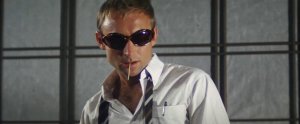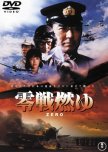Another one for the “Toshio Masuda is one of Japans most underrated directors” pile.
There's something strangely perfect about Zero being directed by Toshio Masuda, having been kicked out of the kamikaze in 1944 for being excessively liberal and pacifistic. It's a real treat to finally see another one of his war epics after so many years, this time him and him alone in the chair. Based on a serialized story by Kunio Yanagida, this is the story of the Mitsubishi Zero through the eyes of the engineers who designed the plane and the pilots who flew it.
Shoichi Hamada is a pilot flying the Imperial Navy's ace in the hole, the Mitsubishi A6M Zero, during the first years of the war the Zero is seemingly unstoppable, shooting down almost every type of plane the allies send at them. Hamada's best friend is Kunio Mizushima, assigned to the ground crew, they are both in love with one girl… but will the ravages of war tear them apart?
Toshio Masuda's direction is simply sublime, taking what worked on Tora! Tora! Tora! over a decade ago and bringing it back tenfold. It is clear Masuda had no love for war and thus directs the film with a dash of gritty realism, unflinching in its portrayal of death, bad decisions and ultimate endeavour for a lost cause. By stark contrast when the film isn't wowing you with its climatic and brutally intense battle sequences, it shines with a glorious use of colour.
The plotting is well done, keeping the story of the Zero first and foremost while framing the story of the young pilot around it. Masuda seemingly backhands the naval authorities for using the pilots as expendable property. In general, the film has no respect for higher authorities, portraying most of them as simply using their soldiers, and not caring about their lives. The story is told in reverse, starting from 1944 and going in reverse to 1937. The pacing is well done, keeping everything at about the same level.
The acting is great on most parts, and even the expats seem to be doing well, it's often noted how poor a lot of them were in Japanese films of the era but here they do a standup job. As for the main characters, they are directed with enthusiasm that goes with their youthfulness. The love triangle is directed well but in a way, it's almost like a precursor to the later Michael Bay shakey-cam fest, Pearl Harbour, ending on that usual "war romance" subversion.
Daijiro Tsutsumi as Hamada brings all sorts of emotions to the table, and by the end, it is clear the Japanese war machine has become him. Kunio Mizushima, played by Jun Hashizume, shows clear concern for his friend as well as a great love for the female love interest, Shizuko Yoshikawa. Shizuko Yoshikawa, herself is a very well-done love interest. She clearly has a mixed bag of emotions for the two leads and loves them both on different levels. Tetsuro Tamba's brief appearance as Isoroku Yamamoto casts him as a very sympathetic man, clearly concerned for the lives of his young pilots despite only appearing for about 5 minutes. Shin Takuma does well as Teruo Tojo, the Zero's financier and Mitsubishi Motors president, showing quite a youthful energy and enthusiasm for his character.
The special effects by later Biollante to Destoroyah Effects Director Koichi Kawakita are very well done, clearly showing off just as much enthusiasm for pyrotechnic effects as his teacher Teruyoshi Nakano. The miniatures look great, and it’s nice to see a few Zero miniatures portrayed accurately as white in the opening 30 minutes. The camera angles during the air battle scenes are daring, and Kawakita makes use of frenetic camera movements during the battle scenes to enhance the combat. There is quite a bit of stock footage in the film, all the way from Storm of the Pacific to Kawakita's own Zero Pilot and to The Imperial Navy, but the original effects all look fantastic and blend very well with Kawakita's efforts.
The music by Harumi Ibe has a dated late 70s-early 80s quality that actually works for the film, and the score uses a lot of horns as well as 70s-style guitar work that make it clear Ibe was primarily used to the 70s style of composing and hadn't quite made the jump to the 80s sound design yet. Even then it's a great score and the film's theme song, Dawn, is sung beautifully by Yujiro Ishihara. Befitting the film's historic ending scene well.
Overall, I can't recommend Zero enough. It's clear how much Toho bought their A-Game in 1984, between this, The Return of Godzilla and Sayonara Jupiter, their tokusatsu efforts were on top form. If you ever get the chance to see it, do so.
Shoichi Hamada is a pilot flying the Imperial Navy's ace in the hole, the Mitsubishi A6M Zero, during the first years of the war the Zero is seemingly unstoppable, shooting down almost every type of plane the allies send at them. Hamada's best friend is Kunio Mizushima, assigned to the ground crew, they are both in love with one girl… but will the ravages of war tear them apart?
Toshio Masuda's direction is simply sublime, taking what worked on Tora! Tora! Tora! over a decade ago and bringing it back tenfold. It is clear Masuda had no love for war and thus directs the film with a dash of gritty realism, unflinching in its portrayal of death, bad decisions and ultimate endeavour for a lost cause. By stark contrast when the film isn't wowing you with its climatic and brutally intense battle sequences, it shines with a glorious use of colour.
The plotting is well done, keeping the story of the Zero first and foremost while framing the story of the young pilot around it. Masuda seemingly backhands the naval authorities for using the pilots as expendable property. In general, the film has no respect for higher authorities, portraying most of them as simply using their soldiers, and not caring about their lives. The story is told in reverse, starting from 1944 and going in reverse to 1937. The pacing is well done, keeping everything at about the same level.
The acting is great on most parts, and even the expats seem to be doing well, it's often noted how poor a lot of them were in Japanese films of the era but here they do a standup job. As for the main characters, they are directed with enthusiasm that goes with their youthfulness. The love triangle is directed well but in a way, it's almost like a precursor to the later Michael Bay shakey-cam fest, Pearl Harbour, ending on that usual "war romance" subversion.
Daijiro Tsutsumi as Hamada brings all sorts of emotions to the table, and by the end, it is clear the Japanese war machine has become him. Kunio Mizushima, played by Jun Hashizume, shows clear concern for his friend as well as a great love for the female love interest, Shizuko Yoshikawa. Shizuko Yoshikawa, herself is a very well-done love interest. She clearly has a mixed bag of emotions for the two leads and loves them both on different levels. Tetsuro Tamba's brief appearance as Isoroku Yamamoto casts him as a very sympathetic man, clearly concerned for the lives of his young pilots despite only appearing for about 5 minutes. Shin Takuma does well as Teruo Tojo, the Zero's financier and Mitsubishi Motors president, showing quite a youthful energy and enthusiasm for his character.
The special effects by later Biollante to Destoroyah Effects Director Koichi Kawakita are very well done, clearly showing off just as much enthusiasm for pyrotechnic effects as his teacher Teruyoshi Nakano. The miniatures look great, and it’s nice to see a few Zero miniatures portrayed accurately as white in the opening 30 minutes. The camera angles during the air battle scenes are daring, and Kawakita makes use of frenetic camera movements during the battle scenes to enhance the combat. There is quite a bit of stock footage in the film, all the way from Storm of the Pacific to Kawakita's own Zero Pilot and to The Imperial Navy, but the original effects all look fantastic and blend very well with Kawakita's efforts.
The music by Harumi Ibe has a dated late 70s-early 80s quality that actually works for the film, and the score uses a lot of horns as well as 70s-style guitar work that make it clear Ibe was primarily used to the 70s style of composing and hadn't quite made the jump to the 80s sound design yet. Even then it's a great score and the film's theme song, Dawn, is sung beautifully by Yujiro Ishihara. Befitting the film's historic ending scene well.
Overall, I can't recommend Zero enough. It's clear how much Toho bought their A-Game in 1984, between this, The Return of Godzilla and Sayonara Jupiter, their tokusatsu efforts were on top form. If you ever get the chance to see it, do so.
Was this review helpful to you?






